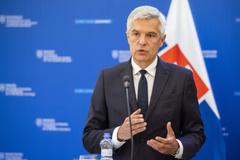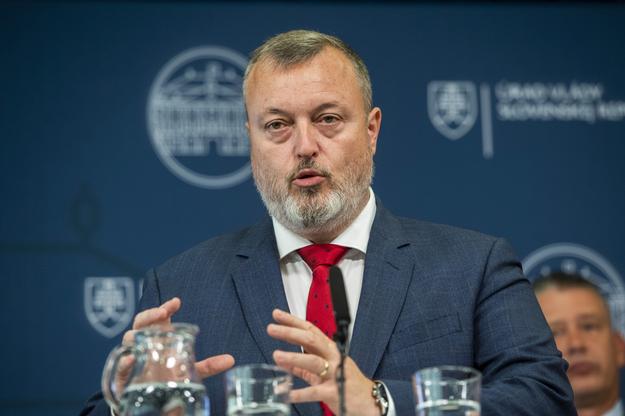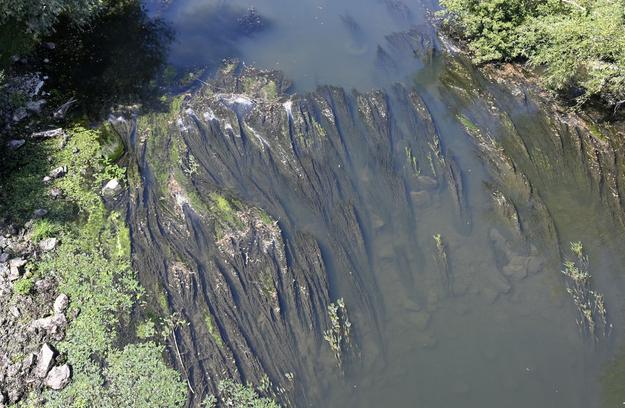Good evening. Here is the Thursday, August 18 edition of Today in Slovakia - the main news of the day in less than five minutes.
Problem with the term liberal democracy
A seemingly innocent sentence in the 'Concept of the Civil Society Development in Slovakia for the years 2022-2030' has drawn the ire of General Prosecutor Maroš Žilinka and Labour Minister Milan Krajniak.
"Civil society is an integral part of the liberal democracy system," is the document's opening, but both men have a problem with the term "liberal democracy".
According to political scientist Gregorij Mesežnikov, Krajniak's objection is motivated by a disdain for liberal democracy while Žilinka's is legal purity.
More stories on Spectator.sk
TRAVEL: An Instagrammable location where you can learn something new.
ART: One last party before a catastrophe? Naked men and bees provide the answer. Andrej Dúbravský's biggest exhibition in Slovakia is open.
SPORT: Slovak sprinter Ján Volko has been in great form at the European Championships in Munich.
If you like what we are doing and want to support good journalism, buy our online subscription. Thank you.
Feature story for today
The Freedom and Solidarity (SaS) party is on its way out of the government. Even though the four parties that make up the governing coalition are still holding talks on a possible compromise, observers see little chance that SaS ministers staying in PM Eduard Heger's cabinet.
If the four SaS ministers do leave, PM Heger (OĽaNO) will need to appoint four new ministers for the economy, education, justice, and foreign affairs.
Foreign policy experts are worried about the latter.

Picture of the day
The Uzh river runs through Ukraine and eastern Slovakia. It is 127 kilometres long, of which around 21 kilometres are in Slovakia. As drought continues in Slovakia the river's level has dropped to just just 6 centimetres in the village of Lekárovce in the Sobrance District.
In other news
Some places in Slovakia experienced a tropical night from Wednesday to Thursday, with temperatures not dropping below 20 degrees Celsius, reports the Slovak Hydrometeorological Institute (SHMÚ). For example, in the village of Plavecký Peter, western Slovakia, it was ten degrees Celsius warmer in the early morning than at the same time the day before.
The SHMÚ issued heat alerts for Friday, August 19. Third-level heat alerts have been issued for the Nitra and Banská Bystrica Regions with a warning that daily temperatures could rise to 38 degrees Celsius. Second-level alerts were issued for the entire Bratislava and Trnava Regions, and some parts of the Trenčín, Košice, and Prešov Regions. First-level alerts are in place for parts of northern Slovakia. Find out where to cool off following this link.
Extreme drought has affected the nutritional value of grasses and plants, as well as the volume of vegetation, and consequently animals on pastures as they have to be fed, according to the non-profit organisation Regional Association for Nature Conservation and Sustainable Development. This will be a problem in the coming previous years.
The Liptovská Mara and Oravská priehrada water reservoirs in north Slovakia are currently at 62 percent of their full volumes. Europe, including Slovakia, is in the grip of a prolonged drought, and reservoirs across the continent are seeing low water levels.
A new primary school with Slovak as its primary teaching language has been established in Šamorín in the the Dunajská Streda district. Education Minister Branislav Gröhling noted there had for a long time been problems accessing education in Slovak in the district.
Nurses' wages will be significantly increased and extra payments based on working experience will be introduced, according to Finance Minister Igor Matovič (OĽANO). However, the head of the Slovak Chamber of Nurses and Midwives Iveta Lazorová pointed out that until concrete sums and conditions for the increase of wages have been mentioned, nurses could not consider the news as good. Nurses, doctors, and other health care professionals are dissatisfied with the current situation in hospitals. Thousands of nurses left after the second wave of the pandemic.
The Public Health Office has issued a warning about a significant year-on-year increase in the number of tick-borne encephalitis cases in Slovakia, especially in the Banská Bystrica Region. So far, there have been three epidemics this season, with a total of 141 people infected. Last year there were only 92 cases. The disease affects the central nervous system and can be spread via certain foods such as unpasteurized products from goat and sheep milk.
The maximum speed on the SNP Bridge in the capital will be reduced from 60 to 50 kilometres per hour, according to Dagmar Schmucková, Bratislava authorities' spokeswoman. The change is in connection with the planned repair of the bridge.
If you have suggestions on how this news overview can be improved, you can reach us at editorial@spectator.sk.



 (source: SME.sk / Hej,ty)
(source: SME.sk / Hej,ty)
 Milan Krajniak. (source: TASR)
Milan Krajniak. (source: TASR)
 The low level of the river Uzh in the village of Lekárovce. (source: TASR)
The low level of the river Uzh in the village of Lekárovce. (source: TASR)